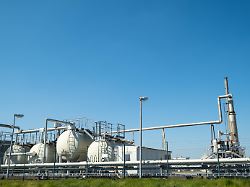Gas price and depreciation
Wintershall Dea is slipping deep into the red
October 30, 2023, 2:50 p.m
Listen to article
This audio version was artificially generated. More info | Send feedback
Oil and gas production for Wintershall Dea is largely stable in the summer. But the prices are significantly lower compared to last year. Together with special costs, the company posted a three-digit million loss.
The oil and gas company Wintershall Dea slipped deep into the red in the summer. The bottom line was that there was a loss of 535 million euros, as the company announced. A year ago there was a profit of 388 million euros. Wintershall Dea referred to impairments and restructuring provisions totaling 587 million euros.
The majority of this was for impairment charges related to the company’s 10 percent interest in the Ghasha sour gas and condensate field in the United Arab Emirates. The capital costs there have increased, “this is now reflected in our revised planning assumptions,” said CFO Paul Smith. The company recorded one-off provisions of 223 million euros before taxes for the austerity program announced in September, to which around one in four of the more than 2,000 jobs worldwide will fall victim.
300 jobs in Germany will be lost
After the end of its business in Russia, which recently accounted for around 50 percent of total production, the group is on a cost-cutting path. In Germany, around 300 jobs are affected by the cuts. The board will be further reduced to three from the previous four members. The company hopes that the measures will continue to generate annual savings of 200 million euros.
The legal separation from the Russian business, from which Wintershall Dea was expropriated as a result of the war in Ukraine, should be completed by mid-2024, confirmed CEO Mario Mehren. “The Russian government has imposed a number of hurdles on all foreign investors who want to sell their shares in Russia,” he said. “This will most likely be a very lengthy process that is beyond our control.” The separation is a prerequisite for BASF to be able to divest itself of its stake in the company. The Ludwigshafen-based chemical group still holds 72.7 percent of Wintershall Dea, the rest lies with the former Dea owner Letterone.
In the third quarter, the company’s operating profit shrank by more than half to 964 million euros, primarily due to low gas prices. The adjusted net result fell from 429 million to 61 million euros. At 324,000 barrels of oil equivalent (boe) per day, production was one percent below the previous year’s level. It was impacted by unplanned maintenance work in the Aasta Hansteen and Skarv fields in Norway. However, Wintershall Dea continues to expect production of 325,000 to 340,000 boe per day for the year as a whole.
